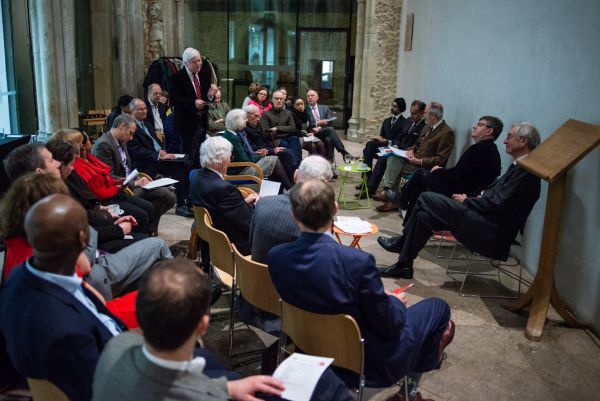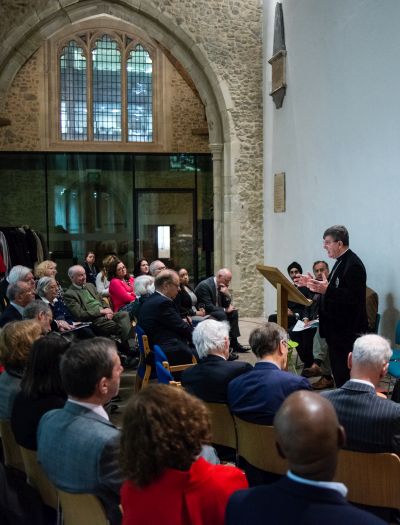Event: Faith in the Livery today: “Rules for the Conduct of Life”
SECTION ONE: Subject: The importance, influence and relevance of this important booklet, which was first published in 1740 as a set of standards for Freemen of the City of London. A copy of the booklet is given to all those who receive the Freedom of the City of London.
Date & Venue: Tuesday 5th March 2019 St Ethelburga’s Centre, 78 Bishopsgate, London EC2N 4AG
Speaker: The Right Rev Dr Stephen Platten, Chaplain to St. Martin-within-Ludgate
Responses: Jasvir Singh (City Sikhs), Rabbi Jonathan Romain, Noorzaman Rashid
Chairman: Michael Binyon, journalist and trustee of St Ethelburga’s
We had 36 paying participants at our recent Faith Group event, from a range of different livery companies; there were some 15 (including spouses) from WCOMC. Along with our chair and speakers we were 40 in total; not quite enough to break even financially at £30 per head; we would have needed 40 or more paying guests to do so.
It was a lively evening, with lots of input from the Chair, the Speaker, the three Respondents and many of those who attended.

Photography: by Niki Gorick of Niki Gorick Photography
After an introduction to St Ethelburga’s by Chairman Michael Binyon and some words about the Faith Group and the programme for the evening (by John Watson), attendees were invited to chat with those whom they had not met before; acting as a kind of “warm up” for the evening.
Bishop Stephen opened with a survey of livery company mottos and their link to Judeo-Christian culture. He went on to examine the different sources of morality and how the “Rules for the Conduct of Life” had influenced the City. He mentioned the many cultural variations in our society, which could be described as increasingly “pluralist”, where all cultures are accepted but there are no shared values, with many inconsistencies in belief systems and world views. He suggested that there are two sources of wisdom, revelation and natural theology, and that all faiths include both. Religions will differ in their reflections on the created world and each can contribute from their scriptures, but both sources can be a rich source of moral truth. Bishop Stephen mentioned Thomas Aquinas, who spoke of being immersed in the cardinal values that come from natural theology (choosing the good) and saw natural law as being the basis for human flourishing and fulfilment; for the whole community, not just for the individual.

Photography: by Niki Gorick of Niki Gorick Photography
In response, Rabbi Jonathan Romain brought in philosophical (e.g. the most common question at school – what happens after you die?), practical (do we live to our full potential?) and political issues (the distortion created by founding faith schools). He noted that religious people can get things wrong and saw a value in “progressive revelation” (e.g. the debate about assisted dying) and in welcoming wealth creation. He concluded by suggesting that religion is about helping individuals and improving public life.
Past Master Noorzaman Rashid brought us back to the “Rules” book and pointed out that a very similar set of rules had been introduced by the Prophet Mohammed in 622 to stop bad things happening in the city of Medina. He reminded us that a similar set of conduct rules can be found in the teaching on “Mindfulness” and that GBS had said “There is only one religion, though there are 100 versions of it”.
Finally, Jasvir Singh gave us some facts and figures about the Sikh religion, noting that the Sikh scriptures came out in 1604; the same time as the St James’ version of the Bible. He drew out several common themes between the Sikh scriptures and “Rules for the Conduct of Life”, in particular Rule Nos 6 (to die well you need to live well, 13 (be in charity with all men, including enemies) and 15 (relieving the poor and helping the distressed). He concluded that we have a lot of commonalities and need to see each other as one big family.
After more canapes and replenishment of glasses, a lively discussion ensued, with lots of comments and questions for all speakers to address. The lack of women on the Panel was noted. Could a set of principles be agreed on? The economic impact of following (or not) the Golden Rule (do unto others what you would have them do unto you) was mentioned. Would rules be better referred to as “values”? Is there a place for modernising the Rules, making them more inclusive and relevant to the world of today?
It is clear that the choice of subject, the content, the speakers, the quality of the discussion, the choice of venue, the timing and the general ambiance were highly valued and the event more than met the expectations of attendees. Acoustics were a problem, which we could have overcome if we had used the two microphones provided more than we did. The food (canapes) were barely enough and only white wine was allowed, which some found limiting. Supporting comments included concerns about the temperature, which was set too low for the last stages of the evening.
In addition to suggesting a project to modernise the Rules, ethics, LGBT and how gender leadership is good for business were included in possible future faith subjects of interest. Additional comments made served to underline the findings of the ratings already presented.
Niki Gorick of Niki Gorick Photography took a series of excellent photos of the event (www.nikigorick.com) in addition to presenting her “Faith in the City of London” book project. Some of these are shown as part of this article.
SECTION TWO; Faith Group Futures
Plans are afoot to widen the constituency of the Faith Group to the livery movement as a whole. Overall participation in Faith Group events has been limited, but they have increasingly attracted the involvement of those from other livery companies who are interested in the issues being presented and debated.
The first stage would be to establish a more visible membership in the Company of those interested in future Faith Group events and projects. Of these, it is anticipated that a small project group of Company members will be formed, with a view to being engaged in widening the active membership of the Faith Group to the livery movement as a whole.
We shall seek to engage with other livery company members, particularly those companies and individuals who have attended our four events and/or who have shown an interest in being involved in the Faith Group. We shall remain open to the ideas of this wider gathering, but two types of project going forward are being considered:
- An annual event, possibly focussing on different aspects of “diversity” in society which impact on business and organisations, including gender diversity, which was suggested by some at the event on 5th March. These could be held in different locations, such as St Paul’s Cathedral where our Chaplain, Rev Helen O’Sullivan is also Chaplain.
- In parallel with this and linked to the same theme, it is anticipated that this broader based Faith Group could work on a companion volume to “Rules for the Conduct of Life”, such as “Shared Values to Celebrate Diversity”. This would endeavour to address the common values that we all share in an increasingly diverse culture in the City. A lot of these shared values came up on 5th March.
John McLean Fox and I would welcome feedback on these ideas and knowing of your interest in being more visibly connected with membership of the Faith Group.


Assistant John Watson John McLean Fox